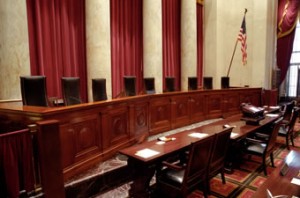 While Appellate Writing and Advocacy (AWA) is a challenging class, it provides law students with the fundamental skills necessary for written and oral advocacy. I spoke with 3Ls who had AWA last fall to get their suggestions for current AWA students on how to succeed in AWA, both writing the brief and doing oral argument. Current AWA students, here are some tips for you.
While Appellate Writing and Advocacy (AWA) is a challenging class, it provides law students with the fundamental skills necessary for written and oral advocacy. I spoke with 3Ls who had AWA last fall to get their suggestions for current AWA students on how to succeed in AWA, both writing the brief and doing oral argument. Current AWA students, here are some tips for you.
During the writing process, Luis Gutierrez suggests that good topic sentences are a great way to get the reader’s attention. Topic sentences help the reader follow your argument and, if written properly, will persuade the reader.
While Haley Stepanek was writing her AWA brief, she found researching the other side’s helpful case law benefitted her. Not only will this help you craft arguments in your brief, it will help you frame your oral arguments and answer any questions the judges may ask regarding the other side’s arguments. Moreover, Micaela Haggenjos advises you to research whether any recent cases have cited the main case you are relying on for their argument. This will be beneficial while writing your brief and may be helpful during oral arguments because a judge may ask whether any recent cases have cited a case you are relying on.
When the time comes to give oral arguments, Brooke Erickson urges you to treat oral arguments “like a conversation” because the more you engage with the judges, the more natural you are going sound. Brooke also says to focus more on the way you are speaking because if you are able to “defend the indefensible with grace, you can defend anything!”
Adam Vanderheyden suggests that you “breathe and slow down,” while also encouraging you to study the best speakers in history to focus on how they pause. Adam also reminds you that you are the experts on the subject, so make sure to act like it when you are in front of the judges. Knowing you are the expert can help calm your nerves. Julie Leary found that even if you are terrified of public speaking, “being the most well-versed person in the room . . . will make you feel more secure and more confident.”
And, remember, different techniques work for different people. Haley found that signing up for all of the opportunities to give oral argument, including scrimmaging with other teams most helpful, but Julie found that practicing with her partner, her coach, and to her cats, worked best for her. Being cognizant of what works best for you and your partner is key to your success.
Finally, Luis recommends treating the whole experience like you are actually representing a client in the U.S. Court of Appeals. While that may seem intimidating, this will be the best way to get the most out of the course. “Most importantly,” Luis said, just “have fun.”

 While Appellate Writing and Advocacy (AWA) is a challenging class, it provides law students with the fundamental skills necessary for written and oral advocacy. I spoke with 3Ls who had AWA last fall to get their suggestions for current AWA students on how to succeed in AWA, both writing the brief and doing oral argument. Current AWA students, here are some tips for you.
While Appellate Writing and Advocacy (AWA) is a challenging class, it provides law students with the fundamental skills necessary for written and oral advocacy. I spoke with 3Ls who had AWA last fall to get their suggestions for current AWA students on how to succeed in AWA, both writing the brief and doing oral argument. Current AWA students, here are some tips for you. Ah, yes, the Baby Lawyer™. The finished product of the intense demands of law school, crisp diploma freshly in hand, joining the fray of the courtroom or the boardroom, ready and oh-so-willing to tackle each and every problem he or she is about to face. So full of life and hope, chock full of caselaw, best practices, tidbits from internships, faculty blessings and encouragement, and an undying love for the Oxford comma. We are blindingly sure that all of our preparation will be enough as we strut into the hallowed halls of the legal profession, away from the strictly regimented last three years . . . and its safety net of office hours and a curved grading scale.
Ah, yes, the Baby Lawyer™. The finished product of the intense demands of law school, crisp diploma freshly in hand, joining the fray of the courtroom or the boardroom, ready and oh-so-willing to tackle each and every problem he or she is about to face. So full of life and hope, chock full of caselaw, best practices, tidbits from internships, faculty blessings and encouragement, and an undying love for the Oxford comma. We are blindingly sure that all of our preparation will be enough as we strut into the hallowed halls of the legal profession, away from the strictly regimented last three years . . . and its safety net of office hours and a curved grading scale.